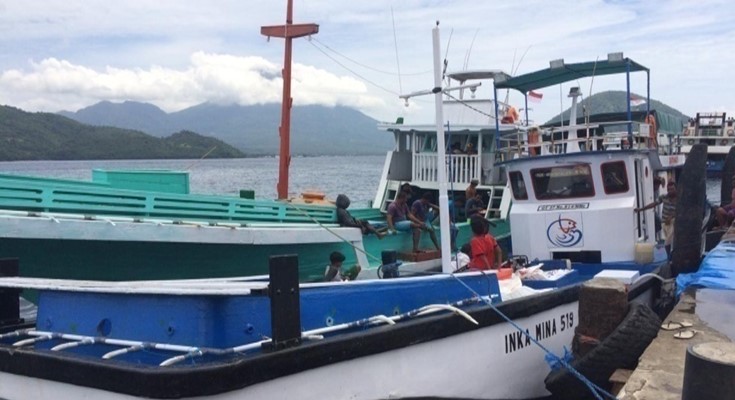Akuatikisle: Jurnal Akuakultur, Pesisir dan Pulau-Pulau Kecil
Full Length Article
Estimation maximum sustainable of skipjack fish in the waters of Ternate Island
Highlights
Generate NLP AI by Wizdam ID.
Abstract
This study aims to determine the productivity of skipjack fish in the waters of Ternate Island. Optimum efforts that produce maximum catch and still maintain stock biomass in equilibrium conditions. Fishing activities are activities carried out to get several catches, to meet demand as a source of food. The demand causes an economic cycle where profits and losses will occur so that fishing activities will be carried out by increasing fish production to achieve maximum profits by fishing businesses. Production and effort data obtained from the Ternate Archipelago Fisheries Port (PPN) and related agencies in the past 5 years (2012-2016) experienced fluctuations. Catches per unit of capture effort (CPUE), reflecting the comparison between the catch and the effort spent. The catch in principle is the output of the fishing activity, while the effort that is needed in principle is input from the fishing activity. CPUE calculations must be standardized for fishing gear first because based on production data there is more than one fishing gear commonly used to catch skipjack fish. It can be seen that in 2013 and 2014 the level of utilization of skipjack fish resources was in the optimal utilization category because the range of skipjack fish production was between 74% to 82%, whereas in 2012 and 2016 the use of skipjack fish in a year was 65% smaller so it was categorized underexploited and in 2015 the level of utilization of skipjack fish resources has experienced overfishing because it has passed the maximum limit that has been set which is 4,252,461.31 tons/year.
Keywords
Introduction
Section snippets
Material and Methods
Materials and methods from the full-text PDF of this article cannot be displayed.
Results
Results from the full-text PDF of this article cannot be displayed.
Discussion
Discussion from the full-text PDF of this article cannot be displayed.
Conclusions
Conclusions from the full-text PDF of this article cannot be displayed.
Acknowledgment
Acknowledgment from the full-text PDF of this article cannot be displayed.
Competing interest
The authors declare that they have no known competing financial interests or personal relationships that could have appeared to influence the work reported in this paper.
Conflict of interest
The authors declare that the research was conducted in the absence of any commercial or financial relationships that could be construed as a potential conflict of interest.
Ethical approval acknowledgements
No ethical approval required for this article. All procedures followed were in accordance with the ethical standards of the responsible committee on human experimentation (institutional and national) and with the Helsinki Declaration of 1975, as revised in 2008 (5)
Supplementary files
Data sharing not applicable to this article as no datasets were generated or analysed during the current study, and/or contains supplementary material, which is available to authorized users.
References (1)
Boesono, H., Anggoro, S., & Bambang, A.N. 2011. Laju Tangkap dan Analisis Usaha Penangkapan Lobster (Panulirus sp.) dengan Jaring Lobster (Gillnet Monofilament) di Perairan Kabupaten Kebumen. Jurnal Saintek Perikanan 1(7): 77-87.
Desiani, R., Susiana, S., & Lestari, F., 2019. Utilization rate of Yellow and blueback fusilier (Caesio teres) at Mapur waters this fish landing in Kelong village, Bintan coastal, Bintan Regency, Indonesia. Akuatikisle: Jurnal Akuakultur, Pesisir dan Pulau-Pulau Kecil 3(2): 49-55. https://doi.org/10.29239/j.akuatikisle.3.2.49-55
Devenport, J. 1994. How and Why Flyning Fish Flay. (Review). Journal Fish Biology and Fisheries 4: 184-214.
Dirjen Perikanan. 1979. Jenis-Jenis Ikan Ekonomis Penting di Indonesia Dirjen Perikanan. Departemen Pertanian. Jakarta.
[FAO] Food and Agriculture Organization of The United Nations. 2015. Fish base. [internet]. http://www.fao.org.
Gulland, J.A. 1983. Fish Stock Assesment.A Manual of Basic Methods. New York.
Gurning, R.V., Susiana, S., & Suryanti, A., 2019. Growth and exploitation status of Indian catfish Plotosus canius in waters of Tanjungpinang City, Riau Islands. Akuatikisle: Jurnal Akuakultur, Pesisir dan Pulau-Pulau Kecil 3(2): 65-72. https://doi.org/10.29239/j.akuatikisle.3.2.65-72
Kusnandar. 2000. Perikanan Cantrang di Tegal dan Kemungkinan Pengembangannya. [Tesis]. Institut Pertanian Bogor. Bogor.
Martasuganda, S. 2005. Jaring Insang (Gillnet). Serial Teknologi Penangkapan Ikan Berwawasan Lingkungan: Edisi Baru. Bogor: Jurusan Pemanfaatan Sumberdaya Perikanan. Fakultas Perikanan dan Ilmu Kelautan. Institut Pertanian Bogor. Bogor.
Rochmady, R., Omar, S.B.A, & Tandipayuk, S.T. 2011. Analisis perbandingan pertumbuhan populasi kerang lumpur (Anodontia edentula, Linnaeus 1758) di perairan Kepulauan Tobea dan pesisir Lambiku, Kecamatan Napabalano, Kabupaten Muna. Agrikan: Jurnal Agribinis Perikanan, 4(2): 15-21. https://doi.org/29239/j.agrikan.4.2.15-21
Rochmady, R., & Susiana, S. 2014. Pendugaan stok ikan kerapu (grouper) di perairan Selat Makassar Sulawesi Selatan periode tahun 1999-2007. Agrikan: Jurnal Agribisnis Perikanan, 7(2): 60-67. https://doi.org/29239/j.agrikan.7.2.60-67
Rochmady, R., 2015. Analisis parameter oseanografi melalui pendekatan sistem informasi manajemen berbasis web (Sebaran suhu permukaan laut, klorofil-a dan tinggi permukaan laut). Agrikan: Jurnal Agribisnis Perikanan 8(1): 1-7. https://doi.org/10.29239/j.agrikan.8.1.1-7.
Saputra, A., Sompie, M.S., & Manoppo, L. 2014. Analisis Tren Hasil Tangkapan Ikan Cakalang (Katsuwonus Pelamis) dengan Alat Tangkap Purse Seine dan Pole and Line (Studi Kasus di Pelabuhan Perikanan Samudera Bitung). Jurnal Imu dan Teknologi Perikanan Tangkap. 1(6): 204-208.
Sudradjat, A. 2006. Studi pertumbuhan, mortalitas, dan tingkat eksploitasi ikan selar kuning, Selaroides leptolepis (Cuvier dan Valenciennes) di Perairan Pulau Bintan, Riau. Jurnal Perikanan Universitas Gadjah Mada, 8(2): 223-228.
Suman, A., Effendi, D.S., & Badruddin. 2011. Tren Indeks Kelimpahan Stok Sumber Daya Ikan Pelagis Kecil di Perairan Teluk Tomini (WPP 716). Buku Status Pemanfaatan Sumber daya Ikan di Indonesia dengan Kasus Teluk Tomini. BPPL P4KSI Balitbang KKP:121-130.
Susiana, S., & Rochmady, R. 2018. Pendugaan Stok Cumi-cumi Loligo sp. di Perairan Kabupaten Pangkajene dan Kepulauan, Sulawesi Selatan, Indonesia. Jurnal Pengelolaan Perairan, 1(1): 14-30.
Tangke, U., Sangadji, I., Rochmady, R., & Susiana, S. 2018. A population dynamic aspect of Selaroides leptolepis in the coastal waters of South Ternate Island, Indonesia. Aquaculture, Aquarium, Conservation & Legislation, 11(4): 1334-1342.
Tangke, U., Silooy, F. D., Malik, F., Rochmady, R., & Susiana, S. 2020. Length-Weight Relationships of Brown-Marbled Grouper Epinephelus fuscoguttatus Forsskål, 1775 in Bobong Taliabu Waters of North Maluku, Indonesia. In 5th International Conference on Food, Agriculture and Natural Resources (FANRes 2019) (pp. 393-396). Atlantis Press. https://dx.doi.org/10.2991/aer.k.200325.078
Tangke, U., Silooy, F. D., Rochmady, & Saing, Z. 2020. Sea surface temperature and chlorophyll-a condition of skipjack tuna (Katsuwonus Pelamis) catching area in Ternate Island marine waters. Journal of Physics: Conference Series, 1517, 012039. https://doi.org/10.1088/1742-6596/1517/1/012039
Widodo J, Suadi. 2006. Pengelolaan Sumberdaya Perikanan Laut. Gadja Mada University Press. Yogyakarta.
Wijopriono, & Genisa, A.S. 2003. Kajian terhadap Laju Tangkap dan Komposisi Hasil Tangkapan Purse Seine Mini di Perairan Pantai Utara Jawa Tengah. Jurnal Ilmu Kelautan dan Perikanan Torani. 13(1): 44-50.
Zahra, A.N., Susiana, S., & Kurniawan, D., 2019. The sustainable potential and utilization rate of Yellowtail scad fish (Atule mate) landed on Kelong Village, Bintan Regency, Indonesia. Akuatikisle: Jurnal Akuakultur, Pesisir dan Pulau-Pulau Kecil 3(2): 57-63. https://doi.org/10.29239/j.akuatikisle.3.2.57-63
Bibliographic Information
Cite this article as:
-
Submitted
13 December 2019 -
Revised
22 April 2020 -
Accepted
23 May 2020 -
Published
31 May 2020 -
Version of record
25 June 2020 -
Issue date
31 May 2020
-
Academic subject
Fisheries; Fisheries Science
Keywords
Copyright
Sangia Advertisement
Copyright © 2020 Al Hasim Taher, Umar Tangke, Djabaluddin Namsa. Sangia Research Media and Publishing. Production and hosting by Sangia (SRM™).  This work is licensed under a Creative Commons Attribution-ShareAlike 4.0 International License.
This work is licensed under a Creative Commons Attribution-ShareAlike 4.0 International License.
Disclaimer: All claims expressed in this article are solely those of the authors and do not necessarily represent those of their affiliated organizations, or those of the publisher, the editors and the reviewers. Any product that may be evaluated in this article or claim that may be made by its manufacturer is not guaranteed or endorsed by the publisher.
Comments on this article
By submitting a comment you agree to abide by our Terms and Community Guidelines. If you find something abusive or that does not comply with our terms or guidelines please flag it as inappropriate.










